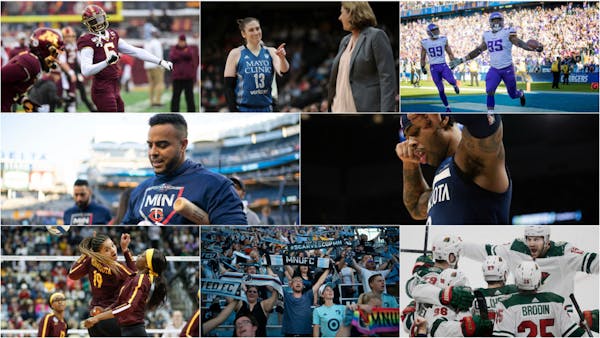The June 6 meeting Eric Kendricks and nine other Vikings attended with Minneapolis police chief Medaria Arradondo came a day before nine City Council members announced in Powderhorn Park they would commit to defunding the city's police force.
Minneapolis' reckoning over its relationship with law enforcement, which moved at a frenetic pace in the days after the May 25 killing of George Floyd, has arrived at a complicated juncture since then.
On Wednesday, the Minneapolis Charter Commission decided to take an extra 90 days to consider a City Council amendment to remake the police department, blocking that measure from going before voters this fall.
If the discussion over the future of Minneapolis' law enforcement practices isn't abating any time soon, neither is Kendricks' voice in the conversation.
The linebacker has been involved with the Vikings' social justice committee since its inception in 2017, and said his time with that group compelled him to speak out in June as one of the NFL's most prominent voices calling on the league to address social justice matters following Floyd's death.
"These are issues we've been facing our whole lives and it's important we talk about them," Kendricks said. "Obviously, football is important, but these are our lives and it's for the betterment of our country."
Speaking hours before Wednesday's vote, Kendricks called for cities to take a more holistic approach to their relationships with the Black community, drawing on his own work with the Hennepin County Juvenile Detention Center and the All Square Institute — a south Minneapolis restaurant that offers jobs to former prison inmates — as part of the Vikings' social justice committee.
While saying, "obviously, having a police force is needed in certain areas," he added that communities needed to shift some of their resources and "start getting at the root of all these problems" by investing in their youth.
"I feel like every year, we see police budgets go up and we see the school system budgets go down," he said. "When you have a lack of resources at school, kids are more likely to fall behind. That just creates the gap further and further. There's a lot of [criminal] offenses that we have that people get thrown in jail for and they can't afford bail. It goes into the justice system as well. People can't afford bail, they stay in jail, they come out and they're on probation, they can't get a job, they have no place to live, and it's just a cycle.
"We've got to start breaking these cycles, we've got to start rehabilitating the people who get in trouble versus just locking them in prison and forgetting about them, because it creates a further gap, it creates lack of education. It's much more complex than that, but as I get into it more throughout the year, I'm going to try to get myself involved with programs [that can help]."
He said Wednesday the Vikings' committee is narrowing down a list of local and national initiatives it wants to work with this year. Vikings ownership, which had donated $250,000 to the committee in 2018 and 2019, made a $5 million gift to social justice causes in June.
Kendricks and fellow linebacker Anthony Barr spent time on a call Tuesday with Juvenile Detention Center residents to encourage the teenagers quarantined there during the coronavirus pandemic.
"Those kids are locked up and quarantined right now in juvenile detention, and a lot of the resources that they normally have are even further restricted," Kendricks said. "They can get a little lonely in there, so it's important for us to check in with them."
As he has chosen to speak out more often, Kendricks has been part of a group that tight end Kyle Rudolph said has helped enlighten its white teammates.
"I'm really proud of Eric," Rudolph said Wednesday. "I'm also really proud of our organization as a whole. Whether it's guys like Eric Kendricks, or Ameer Abdullah, Ant Harris, Anthony Barr, those guys have been very passionate about this, and it's really educated the rest of us in the locker room, because me, myself as a white male, I've never had to deal with that kind of stuff, but now I can empathize with them because we've had those hard discussions.
"I've sat with them in countless meetings, and I hear their stories and the problems they've had. Now, I can be an ally and help them."
The NFL has shown more public openness toward player activism since Commissioner Roger Goodell's June 5 video saying the league had not done enough to encourage it.
Other professional leagues have restarted their seasons with notable gestures. Wild defenseman Matt Dumba gave an impassioned speech against racism before NHL games on Saturday. Numerous Twins players knelt during the national anthem of the club's home opener on July 28. The NBA and WNBA painted "Black Lives Matter" on their courts and put social justice messages on their jerseys during the Florida-based restarts of their season.
"I love it," Kendricks said. "Obviously, the WNBA is a league that has been on top of these issues and been at the forefront of every issue. They are way ahead of everyone as far as being active and vocal about these things. I feel like everyone is catching up to where they are.
"These things are important, and a lot of these issues attack a lot of players' communities directly."


